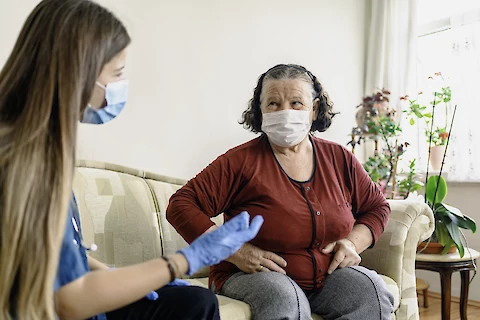
What Every Senior Woman Needs to Know About Cervical Cancer
Cervical cancer is a type of cancer that affects the cervix, which is the lower part of a woman's uterus. It can be caused by certain strains of human papillomavirus (HPV). Cervical cancer is highly treatable if detected early and can often be cured completely. For senior women, understanding their risk for cervical cancer and getting regular screenings are vital to detecting and treating it in its early stages.
How Common is Cervical Cancer?
Cervical cancer used to be one of the most common causes of death from cancer among women. However, the number of deaths has declined significantly in recent decades due to increased screenings and awareness. Still, around 13,000 cases are diagnosed in the United States annually, and approximately 4,000 of those cases become fatal.
Risk Factors for Cervical Cancer
Certain factors may increase your risk of developing cervical cancer. These include:
- Having multiple sexual partners
- Weakened immune system
- Smoking
- Using oral contraceptives for an extended period
- Being infected with HPV
Recognizing the Symptoms
The symptoms of cervical cancer can vary from person to person, but some common signs include abnormal vaginal bleeding or discharge, pain during intercourse, and pelvic pain. If you experience these symptoms, speak with your doctor immediately.
Treatment Options
The treatment options for cervical cancer depend on the stage of the disease. It can often be treated with surgery or radiation therapy in its early stages. In more advanced cases, chemotherapy and immunotherapy may be recommended.
Ways to Reduce Your Risk of Cervical Cancer
You can reduce your risk of developing cervical cancer in several ways:
Get Vaccinated
HPV vaccines are available to protect against certain strains of HPV that can cause cervical cancer. These vaccines are recommended for boys and girls aged 11-12 and young adults who didn't get vaccinated at a younger age.
Get Screened
It's important to get regular screenings for cervical cancer, even if you don't have any symptoms. These screenings can detect abnormal cells in the cervix before they develop into cancer. The Pap test is the most commonly used screening for cervical cancer and should be done every three years starting at age 21. Women over 65 who have had normal Pap smears in the past are generally advised to be screened every five years or more frequently if recommended by their doctor.
Healthy Lifestyle
Having a healthy diet, exercising regularly, and avoiding smoking can also help reduce your risk of developing cervical cancer. Making these lifestyle changes now can help you stay fit and potentially reduce your chances of developing the disease in the future.
Practice Safe Sex
Limiting your sexual partners and ensuring you always use a condom during intercourse can help reduce your risk for cervical cancer.
Are You a Senior Looking for More Support With Your Health?
If you have any symptoms of cervical cancer, or if it's been more than three years since your last Pap test, make an appointment with your doctor right away.
Talk to the Senior Helpers Palo Alto team if you are a senior in Palo Alto, Santa Clara, Sunnyvale, or Menlo Park who wants more support with wellness issues. We offer senior in-home care that can help you get more exercise, eat healthier meals, and attend your doctor's appointments to help promote good health. You can contact us today for more information on how Senior Helpers Palo Alto can help you stay healthy and independent in your own home!